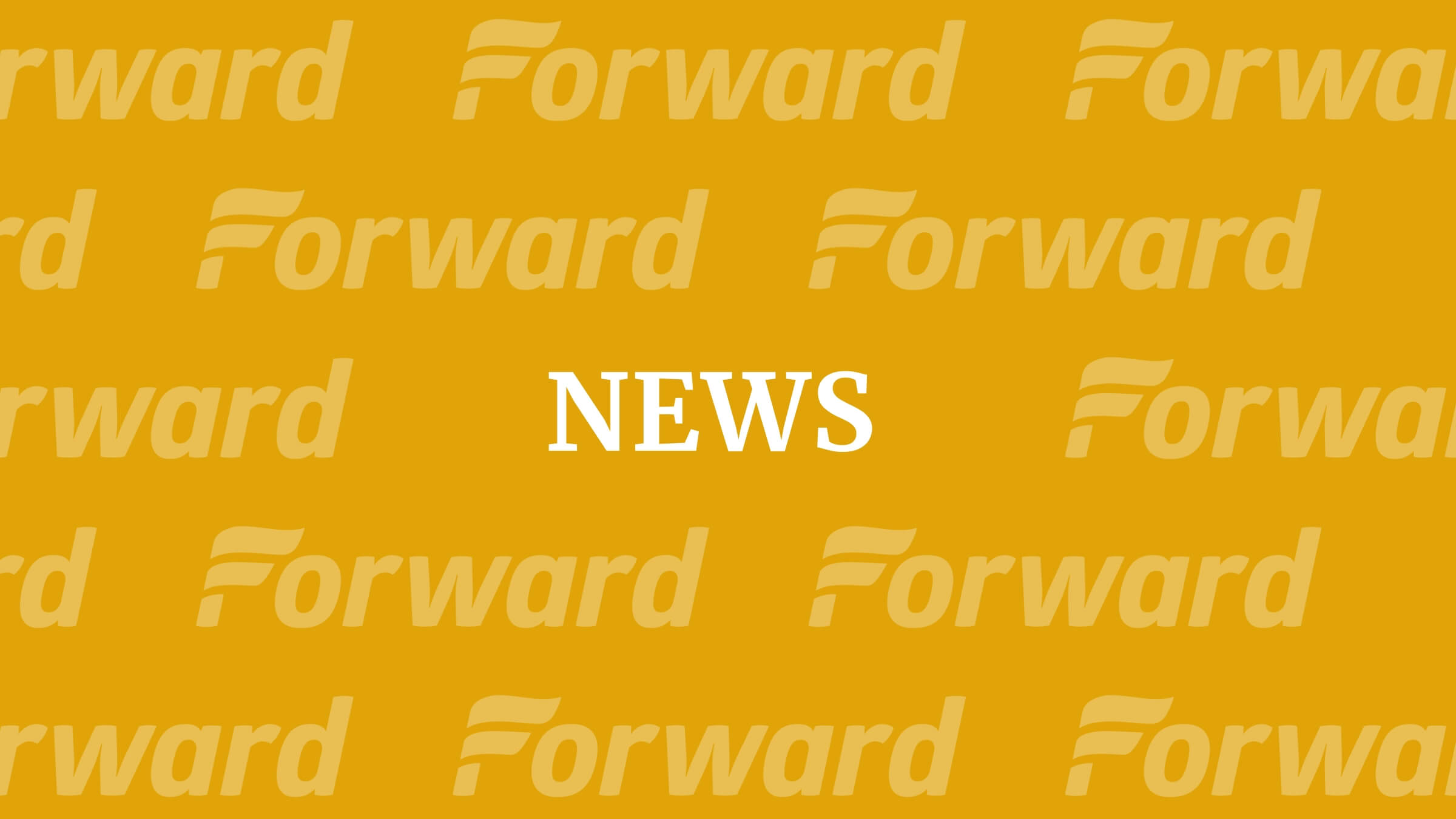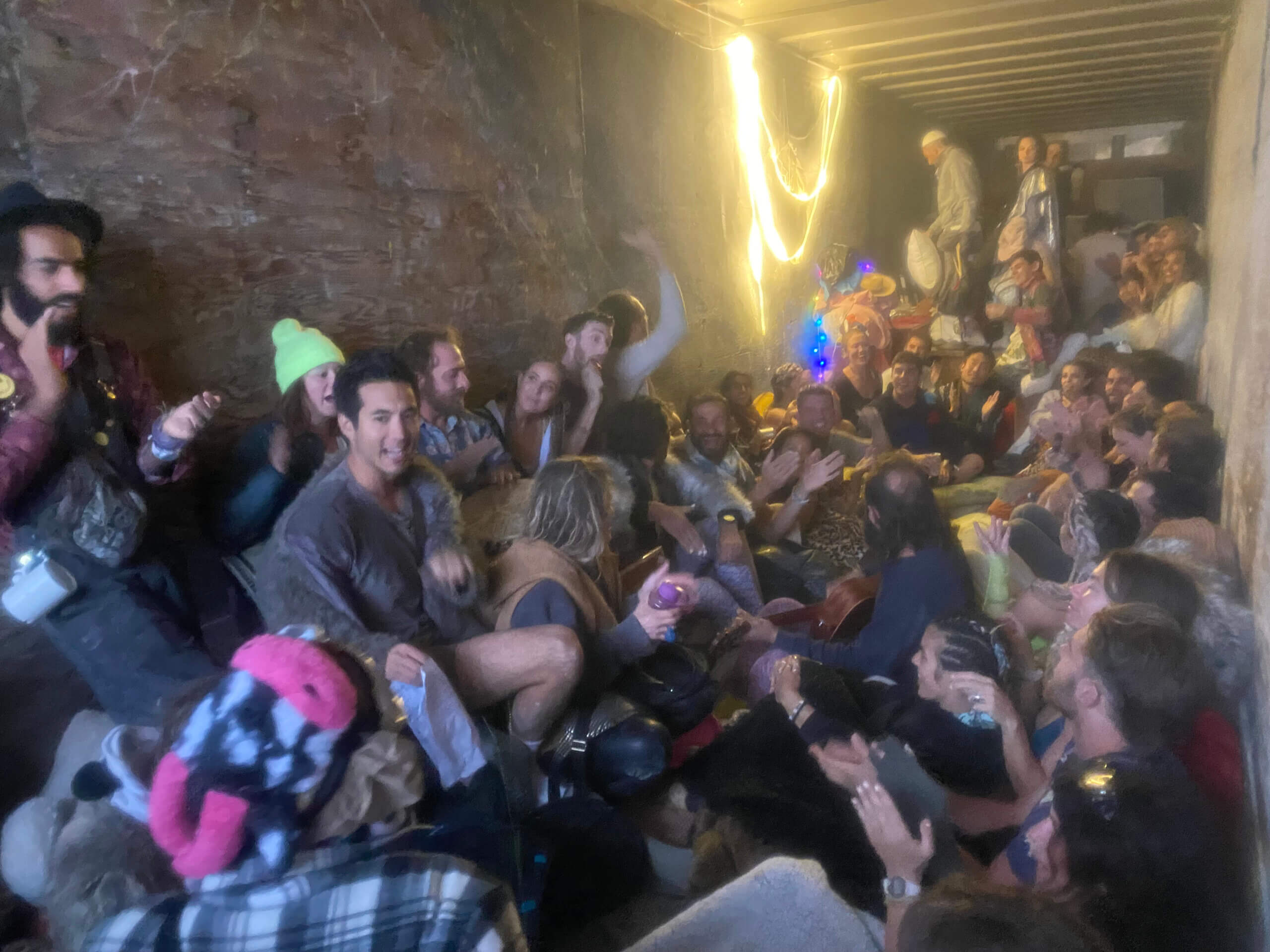With Burning Man caked in mud, Jewish camp saved the day
A deluge of rain and mud didn’t stop a one-of-a-kind Shabbat service at the desert festival.

Graphic by Angelie Zaslavsky
Crowds at the Kabbalat Shabbat service held every year at the Burning Man festival regularly number in the several hundred. But when it began to pour in the Black Rock Desert of Nevada on Friday afternoon, transforming the desert landscape into a diabolical mud pit, the Jewish camp that leads the service — and prepares a hearty dinner to serve afterward — wasn’t sure anyone would show up.
Then, around 6:45 pm — just when prayers were scheduled to begin — a camper walked up, boots wrapped in garbage bags, rain-drenched and splattered with the infernal muck, and asked: Is Shabbat still happening?
“We all kind of looked at each other and were like, ‘Yes!’” said Kyle Lemle, a member of the Milk + Honey camp, which has led a Shabbat service at the festival since 2010. “And that’s kind of when we knew — like, sh-t, people are still coming.”
Meeting the Burning Man call of resilience, the Milk + Honey crew improvised in the worst rain the festival had seen in decades. The prayer service, normally held in a vast outdoor space with a stage, microphones and loudspeakers, relocated to a shipping container, where more than 100 people packed in — shoes off — for a Kabbalat Shabbat that will be easier to clean off than forget.
A few who had trekked across the festival area to get there ended up camping there. And with much of the camp grounded and the festival’s organizers calling to conserve food as tens of thousands were stuck and stranded, the leftovers from a meal the camp had prepared for 1,000 became a bountiful resource.
“We were joking that we were like the Black Rock City chapter of HIAS because we had all these refugees coming to us for food and shelter,” said Zvika Krieger, who co-led the Shabbat service this year for the sixth time.
The camp of about 50 volunteers wasn’t prepared for the deluge, but they were lucky in one important way: The tent where they did their cooking was waterproof, enabling preparations to continue even as their shoes sank deeper into the mud.
As more people arrived to the camp on foot — with at least one having hiked an hour through the morass to get there — a knot of mud-caked shoes grew by the shipping container’s entrance. Inside, blankets and pillows spread across the floor to allow people to sit for a necessarily acoustic ceremony featuring a guitar, harmonium, and, naturally, a shofar.
Krieger, the spiritual leader of the Berkeley renewal congregation Chochmat HaLev, worked the inclement weather into his sermon. Lemle, who leads a social justice choir in Oakland, tacked on another 20 minutes of songs after kiddush and hamotzi, as people carefully made their way out of the container.

Even a leaky roof couldn’t dampen the atmosphere — indeed it only seemed to enhance it. One Milk + Honey volunteer, Ben Poretzky, watched as one person stood under the worst leak with his cup held out to catch it — everyone at Burning Man carries a cup — with others volunteering their cups when his was full.
Krieger described the atmosphere in their sacred container as “a cuddle puddle.”
“Every single person in there, Jew or not Jew, was singing their hearts out because it just felt so vital,” he said. “People really needed that lift. People needed Shabbat. Like, the rain can pause Burning Man, but it can’t pause Shabbat.”
Then came dinner, a buffet of lentil stew, cabbage salad, couscous and haroset that was made on site that day, to go with wine and challah.
Only about a quarter of the food was eaten that night, he said, precipitating “the ancient tradition of Shabbos day leftovers.” People came throughout Saturday seeking food, which was at a premium with some camps’ kitchens inoperable due to the rain and many wondering if they were going to be stuck at the site for another week.
Later Saturday, Milk + Honey started making deliveries to neighboring camps. Central to the rations, Krieger said, was another Jewish staple, of Sunday mornings. “We made a massive batch of challah French toast. Like maybe hundreds and hundreds of slices of challah French toast.”















